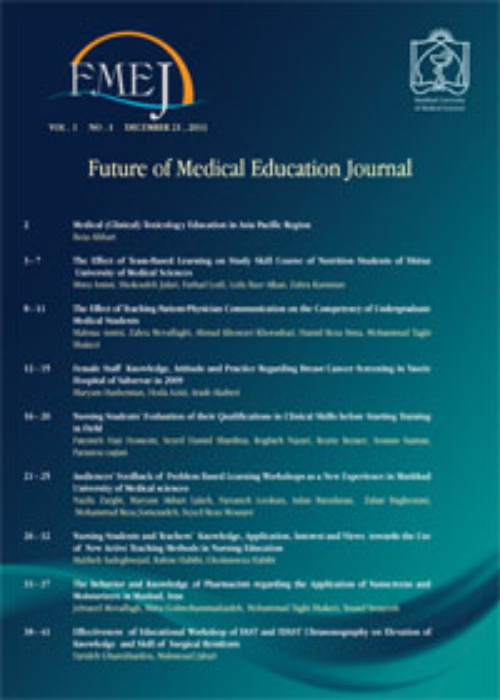Jigsaw: A good student-centered method in medical education
Author(s):
Abstract:
Introduction
Today, student-centered methods must be used to train students with professional competency. One of the most valuable methods is Jigsaw (JT). Despite its various positive effects on students learning, not all teachers are familiar with Jigsaw. In order to familiarize teachers with this method and encourage them to use it in teaching their students, this article introduces Jigsaw, its types, its effects, and its applications as well. Method
This is a review study evaluating the related articles using keywords such as Jigsaw Method, cooperative method and student- centered learning in Pub Med, ProQuest, Scopus, SID, and Magiran in 2004-2017. At first, 122 papers were found and finally 46 articles were examined.Results
JT is a cooperative teaching method in small groups and its stages include: activities before class by teacher (preparing written curricula and preparing test), activities during class (forming random home groups, providing the same course content to all groups, individual study at a particular time, forming JT groups and discussion on content at a particular time, returning to home groups, designating an administrator in each group, and providing content by any of the members of home groups to the other group members at a specific time), evaluating groups through multiple-choice tests. JT is a small group that has 4 types (I, II, III, and IV). The positive effects of JT include: an increase in motivation, enjoying learning, learning achievement, self-confidence, and self-esteem, refreshment of information, interest, and communication.Conclusion
This cooperative method can be used in different educational levels (primary school, high school, and university) as well as in different disciplines (Medicine, Nursing, Dentistry, Rehabilitation, Midwifery, Pharmacy, Medicine, Education, English, Social Sciences, Chemistry, Islamic Education, Physics, and Mathematics. This cooperative method is recommended to teachers in different courses to improve various aspects of student's intelligence such as critical thinking, problem solving, achievement, self esteem, self confidence, and interest for learning.Keywords:
Language:
English
Published:
Future of Medical Education Journal, Volume:7 Issue: 1, Mar 2017
Pages:
35 to 40
magiran.com/p1695262
دانلود و مطالعه متن این مقاله با یکی از روشهای زیر امکان پذیر است:
اشتراک شخصی
با عضویت و پرداخت آنلاین حق اشتراک یکساله به مبلغ 1,390,000ريال میتوانید 70 عنوان مطلب دانلود کنید!
اشتراک سازمانی
به کتابخانه دانشگاه یا محل کار خود پیشنهاد کنید تا اشتراک سازمانی این پایگاه را برای دسترسی نامحدود همه کاربران به متن مطالب تهیه نمایند!
توجه!
- حق عضویت دریافتی صرف حمایت از نشریات عضو و نگهداری، تکمیل و توسعه مگیران میشود.
- پرداخت حق اشتراک و دانلود مقالات اجازه بازنشر آن در سایر رسانههای چاپی و دیجیتال را به کاربر نمیدهد.
In order to view content subscription is required
Personal subscription
Subscribe magiran.com for 70 € euros via PayPal and download 70 articles during a year.
Organization subscription
Please contact us to subscribe your university or library for unlimited access!


